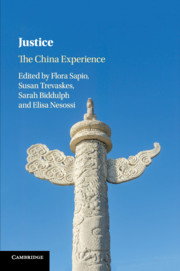Book contents
- Justice
- Justice
- Copyright page
- Contents
- Contributors
- Part I Constructing the Idea of Justice
- 1 The Expression of Justice in China
- 2 State, Society and the Justice Debate in Contemporary China
- 3 High Justice versus Low Justice
- 4 Rawls Rejected, Ignored and Radicalised
- Part II The Performance of State Justice
- Part III Expressing Justice in the Public Arena
- Part IV Justice in Action and Law
- Index
- References
4 - Rawls Rejected, Ignored and Radicalised
Debating Procedural Justice in China
from Part I - Constructing the Idea of Justice
Published online by Cambridge University Press: 02 August 2017
- Justice
- Justice
- Copyright page
- Contents
- Contributors
- Part I Constructing the Idea of Justice
- 1 The Expression of Justice in China
- 2 State, Society and the Justice Debate in Contemporary China
- 3 High Justice versus Low Justice
- 4 Rawls Rejected, Ignored and Radicalised
- Part II The Performance of State Justice
- Part III Expressing Justice in the Public Arena
- Part IV Justice in Action and Law
- Index
- References
- Type
- Chapter
- Information
- JusticeThe China Experience, pp. 92 - 110Publisher: Cambridge University PressPrint publication year: 2017
References
- 3
- Cited by



